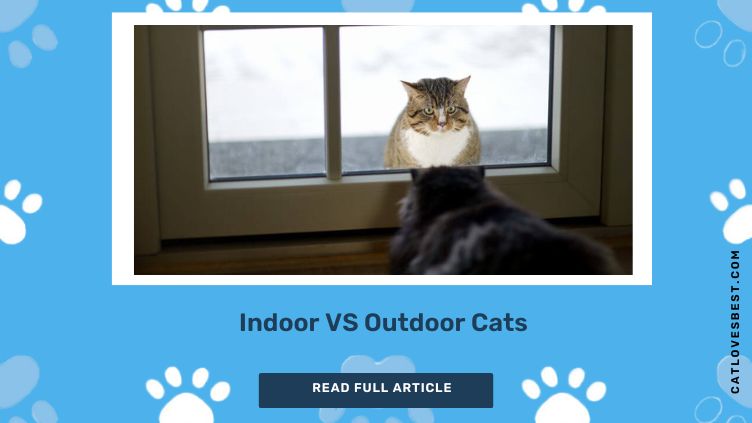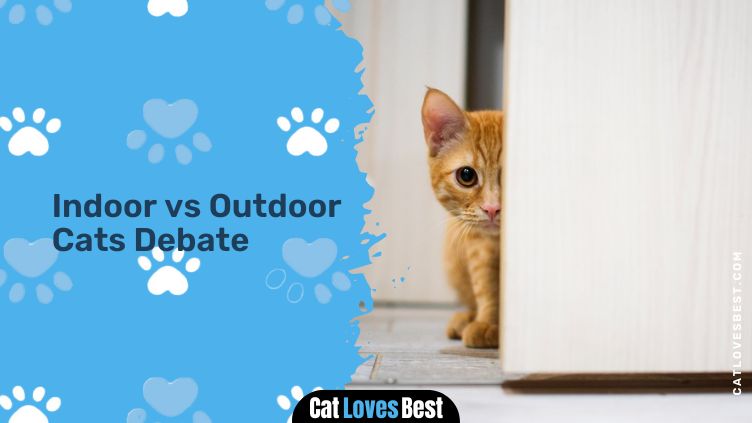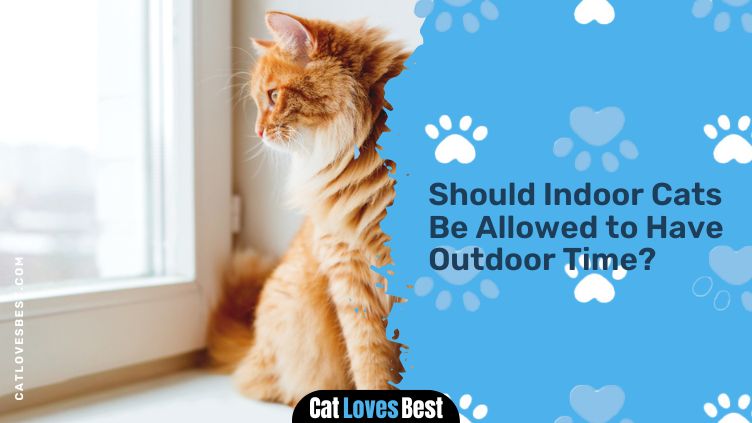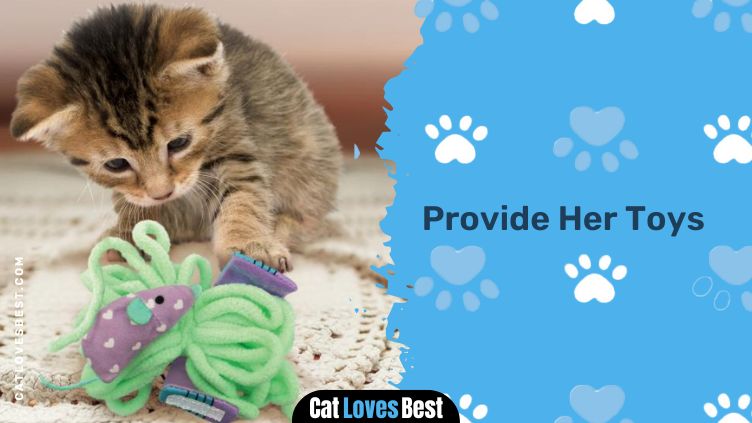It’s a never-ending debate.
Many pet parents have a doubt or get confused between indoor and outdoor lifestyle of cats. They try to search information related to lifestyle of indoor vs outdoor cats.

So, by observing such demands we have decided to do some research work for you and gathered information which will help you to know what’s better for your feline pal.
In this blog, you are gonna explore the debate regarding indoor vs outdoor cats lifestyle. In addition, the perks and drawbacks are also highlighted as well as tips to stimulate your indoor kitty.
Just scroll down to know in-depth information regarding indoor vs outdoor cats.
Indoor vs Outdoor Cats Debate
Well, it’s a fact, that indoor cats get a comfortable lifestyle as compared to outdoor ones. They get healthy treatment which helps to expand their lifespan and live healthy lifestyles. An indoor cat lives for around 15-17 years, on the other hand, an outdoor cat live for 2-5 years.[2]

Apart from lifespan expectancy, there are other criteria, which also indicated that the indoor cat lifestyle is safer than compared of outdoor cats. So, we have done some footwork and jotted down the perks and cons of both indoor and outdoor cats, which will help you to get a clear view regarding this debate.
Let’s explore the perks and drawbacks of both indoor and outdoor cat lifestyles.
Perks of indoor cats:
- Regular vet visit
- Gets healthy meal
- Fewer injuries or scars on her body
- Proper grooming
- Encountered fewer diseases, and get treatment on time
- Lifespan is more like around 13-15 years
- Get a safer environment to live in and always be surrounded by some guidance
Drawbacks of indoor cats:
- Becomes lazy
- They are more dependent on their pet parents for little things also
- Loss of the practice of hunting
- If the kitty doesn’t want to stay, she will easily escape from that place
Perks of outdoor cats:
- Great hunters
- Won’t have to face litter box issues
- Always remain fit and don’t have to worry about gaining weight
Drawbacks of outdoor cats:
- Shorter lifespan as compared to indoor ones, basically around 3-7 years
- More injuries and scars on her body
- Life threat levels increases
- Lack of appetite
- Encountered severe underlying health issues
- No vet visit for the treatment
Now, you have a fair idea regarding indoor vs outdoor cats, their benefits, and drawbacks. So, it’s up to you, how you want to treat your kitty, and what type of lifestyle you prefer for your feline pal.
Should Indoor Cats Be Allowed to Have Outdoor Time?
As per PetMD, “It’s important for owners to remember that cats are nocturnal, and in the wild, they’d be hunting all night and sleeping all day. Sometimes an indoor cat gets bored and may get anxious being cooped up inside all of the time if it isn’t given enough stimulation,” says Dr. Mosoriak.“

We know cats are predators and natural hunters so even indoor cats have this hunting skill and crave for stepping outside the house and exploring the world on their own. But letting them go outside is a risky thing and life-threatening for them.
This is because being indoors for long period, and always surrounded by guidance makes them a little weak to regain their power to fight against the predator or other animals.
If pet parents want their kitty to step outside, and have some time exploring the world. For them, we have a suggestion allow them to go outside but make sure you are with them, and before taking her out train her well.
For instance, get used to harness and leash. So that she won’t feel uncomfortable while going out, and brushed up on her hunting skills. Because if she is away from you, and any predators or animals attack her she is able to protect herself from them.
How to Keep an Indoor Cat Stimulated?
After doing an ample amount of research we have also come across that even the PETA Foundation agrees that all cats should be kept indoors. And they have in fact covered a few tips, which can help to keep your kitty stimulated and happy inside the house.[1]
Here are a few prevention tips, which will help you keep your feline pal happy and not get bored inside the house.
Provide Her With a Healthy Meal
Cats step outside the house to hunt and fill their tummy. So if you provide her a healthy meal that includes animal protein then she will not urge to step outside the house. This is because if she is getting proper meal, which includes all the ingredients, her body needs to fulfill the nutrients level of her body to function well.

They crave animal meat, so it is suggested to provide her meal that includes animal-based ingredients as the primary. And give her essential nutrients that her body craves for better function.
Take Her Out for a Walk
Apart from providing a healthy meal to your kitty, it is very necessary to take her out for a walk. This is because it will not only give her fresh air, but also help her to stay active rather than eating the whole day, and spending time laying on her couch and doing no physical activity.

Before taking her out for a walk train her well, like first let her get comfortable with the leash. Otherwise, she won’t allow you to wear her leash or belts and there are chances out of uncomfortness she will try to run away.
So, if you keep a habit of taking her out for a walk it will automatically reduce her desire to explore the world. And by observing other animals on the streets, and people she will not demand to step outside the house.
Engage Her With Physical Activities
Cats are hunters and they have the instinct regarding the negative environment and vibes, so they always stay alert when to save their life or family members. Even if your kitty stays indoors still she has that instinct and skills, which only needs to brush up with time.
All you need to do is carry out physical activities with her on a regular basis, like play with her, assign her task to bring toys, provide her climbing post, scratch post, hunting games for her, etc. These will help her to stay active, and also help you to maintain her weight.
In this way she will not demand to step outside the house and will remain safe and healthy, enjoying an indoor lifestyle.
Plant a Garden
Another way to keep your kitty indoors is by planting a mini garden for her, and you know cats like to roam here and there, so if you plant a dedicated mini garden for her that only have those plants which are safe for your feline pal. She will surely like it and whenever she feels like stepping outside the house, train her to spend time in that garden.

Cats like to nibble leaves and rub their body on grasses so both mentally and physically it’s a good idea to plant a garden she will be able to climb, jump in the area and breathe fresh air.
In the mini lawn area, you can place a scratching pole for your kitty where she can jump and scratch her claws. It will help to groom her claws, and another thing she will enjoy spending time in the backyard.
Provide Her Toys
To keep your kitty inside, providing her toys especially interacting ones will help to keep her active and happy inside the house. Many interactive toys are now easily available in the market such as climbing toys, puzzle toys, catnip toys, scratchers, etc.

These toys will surely help to engage your kitty’s mind and she won’t feel lazy or bored. so, rather than sleeping the whole day, she will invest her time in playing, and her mind will not wonder about going outside the house and exploring the world on her own.
Note:- Apart from all these tips or prevention it is suggested to also look after your kitty’s toiletry habits and provide her good quality litter. This will help you to divert her mind towards the litter box and she will do her business in that zone only. It will also help you to prevent her stay inside as she will not search any other place outside the house to do her business.
FAQs
How long can an indoor cat live outside?
Generally, indoor cats live longer than outdoor cats, a fair estimate is around 13-17 years. But, if you allow your indoor cats to step outside on a daily basis, then there are chances their lifespan might decrease due to hazardous life. She might end up living around 3-5 years if not taken good care of and allowed to roam outside without guardians.
Is it cruel to make an outdoor cat indoors?
Well, if you restrict your indoor cat from stepping outside in your absence it’s easy because they will listen to you and will adapt this habit. But, restricting outdoor cats to step outside the house is not an easy transition, it takes a lot of hard training to train them. So, yeah making an outdoor cat indoor is not cruel but it is a tough task.
What diseases can outdoor cats carry?
Since outdoor cats do not get proper care and a healthy lifestyle so they encounter many health issues such as scratching, roundworms, rabies, toxoplasmosis, and other severe underlying health diseases.
Well, It’s a Wrap!
Oh! You landed on the last paragraph. Great!
Confidently, we were able to solve your doubts related to indoor and outdoor cats, and whether you should allow your kitty to live an outdoor life.
As you now know very well whether it’s indoor or outdoor both have perks and drawbacks sides, so accordingly you have to treat your kitty and give her life what she deserves more.
We have recommended you few prevention tips also which will help to keep your kitty stimulated and she will not get bored or lose her hunting skills. If you will follow those tips, then surely will be able to keep her happy, and provide a healthy lifestyle. In which her body is strong enough and she still has that hunting skill on point.
References:
- Herron, M. E., & Buffington, C. T. (2010). Environmental enrichment for indoor cats. Compendium (Yardley, PA), 32(12), E4.
- Persichetti, M. F., Pennisi, M. G., Vullo, A., Masucci, M., Migliazzo, A., & Solano-Gallego, L. (2018). Clinical evaluation of outdoor cats exposed to ectoparasites and associated risk for vector-borne infections in southern Italy. Parasites & vectors, 11(1), 1-11.

